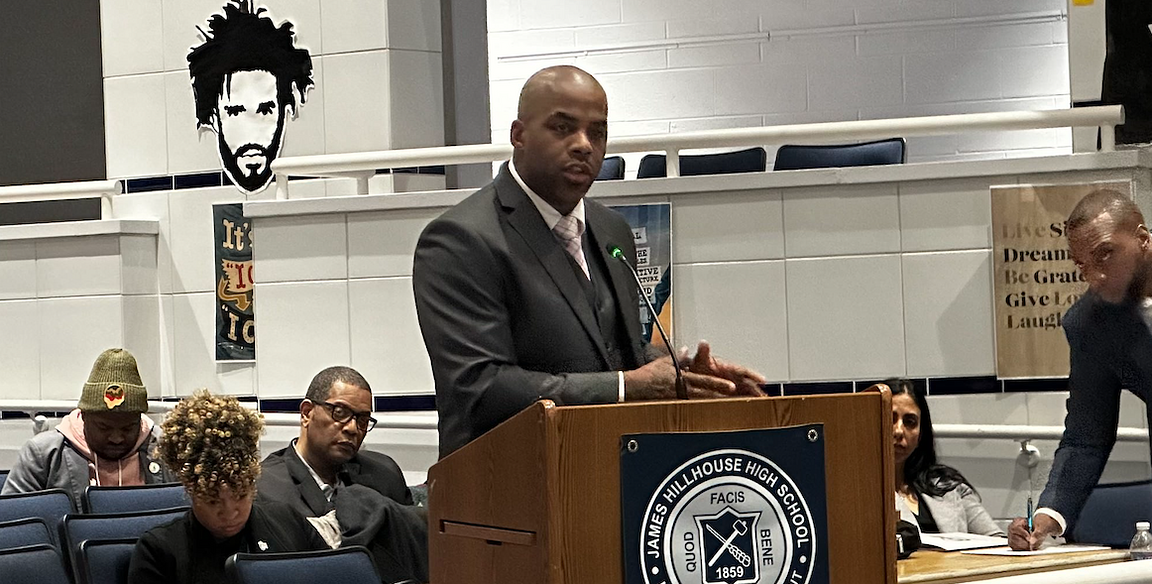
NEW HAVEN, CT – When the state made public buses free during the pandemic, it was a lifeline for Sean Tomany’s high school students. They could get to school earlier, stay later, participate in extracurriculars, and meet one-on-one with teachers.
The free buses went away, as did the opportunities that so many of his students could access for a short while, helping make sure they did not join the one in five kids in Connecticut who have dropped out or are at risk of dropping out – otherwise known as disconnected youth.
Tomany, who works at University High School of Science and Engineering in Glastonbury, told that story Tuesday night at a coming-out event at New Haven’s Hillhouse High School for a new bipartisan statewide effort to help kids who are falling through the cracks of society.
The group organizing the event is called the 119K Commission. It is a partnership between Connecticut Conference of Municipalities and the Dalio Education organization.
The commission formed after a report compiled by the Boston Consulting Group found that one in five Connecticut children — or, about 119,000 children — are at risk of dropping out, have dropped out, or are unemployed and disconnected from society. CCM is looking to craft substantive policy proposals to address the problem.
Step 1: CCM and the 119k Commission are hosting eight regional panels across the state over the next six months, highlighting different parts of the crisis. Tuesday’s Hillhouse gathering on Tuesday was the first panel, featuring stories and advice from people who have found their way back from the brink or helped others to do so. (Watch the full hearing here or at the bottom of this story).
The event began with close to two hours of expert testimony from Tow Youth Justice Initiative (TYJI) Director Erika Nowakowski, former TYJI Director William Carbone, TYJI Research Director Danielle Cooper, Norwalk High School Assistant Principal LaShante James, and United Way Connecticut CEO Lisa Tepper Bates with regional elected officials hearing the presentation and asking the panelists questions.
James told the panel of elected officials and the audience about her experience growing up in New Haven and working at Riverside Academy, an alternative high school for teens in trouble.
“One of my students just fell off the face of the earth, and I had to go find him,” James said. “So when I found him, I felt like I had just won the lottery. But listening to his story about why he works, the obligations you have back at home, and why he returned to school, I felt I didn’t have the resources to re-engage. He also needed a program that would allow him to support himself and his family.” James reached out to a team of people to devise a plan.
“But I need more help,” she added.
For all five panelists, no single issue is forcing kids out of the system. Many students have to work 40 hours per week to support their families. Many have to take care of younger kids. Some lack stable housing or food. Some have no adult role models. The number of students with undiagnosed mental health conditions or learning disabilities also remains unknown.
So, put simply, these kids are “not bad kids” but rather children who “are expected to be like adults at 14,” said panelist Sean Allen of the Hartford-based nonprofit Equity Enrichment Alliance.
Building on Allen’s and James’ points, Bates told the room that an essential part of United Way’s work is tying state, federal, and local resources together because a lot of the time, there is a program, resource, or funding for an issue that someone helping out a disadvantaged child. They just might not know about it.
“So much of our time as educators is looking for things and taking a little from here and there to get what we need in the end,” Allen said. “We just need to make it a bit easier for people. I should be able to have a sheet with all the info I need. I should just be able to make one phone call to help my kids.”
Dajuan Williams, director of the Norwalk-based nonprofit Youth Business Initiative, told the panel about being a disconnected child himself, how he got back into the system, and how important it is for the panel to also focus on children who are already incarcerated.
Shayla Arunio, another self-described “lost kid” who had found her way back, told the panel that they need to focus on building better housing in the state and making it more accessible.
“If people have housing, they can be better parents and be there for their kids,” Arunio said.
